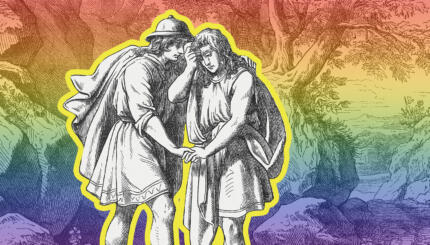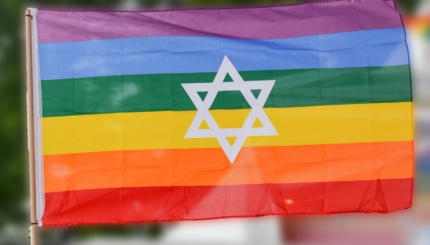Jews read sections of the Torah each week, and these sections, known as parshiyot, inspire endless examination year after year. Each week we will bring you essays examining these portions from a queer perspective, drawn from the book Torah Queeries: Weekly Commentaries on the Hebrew Bible and the Torah Queeries online collection. This week, Rabbis Elliott Kukla and Reuben Zellman examine parashat Ki Teitze, proving that clothes most certainly don’t make the person.
For all those who have ever struggled with how to discipline children’s bad behavior, this week’s parashah, Ki-Teitze, offers an easy answer: stone them to death! (Deut. 21:18-21)
Thankfully, Jews have recognized for over a thousand years that this is an unacceptable solution to a common problem. In fact, we learn in the Talmud (Sanhedrin 71a) that this apparent commandment of the Torah was never once carried out. Our Sages refused to interpret this verse literally, as it conflicted with their understanding of the holiness of each and every human life.
With this scenario in mind, let us look at another verse in our parashah: “A man’s clothes should not be on a woman, and a man should not wear the apparel of a woman; for anyone who does these things, it is an abomination before God.” (Deut. 22:5) Just as classical Jewish scholars reinterpreted the commandment that says rebellious children should be stoned to death, they also read this portion’s apparent ban on “cross-dressing” to yield a much narrower prohibition.
The great medieval commentator Rashi explains that this verse is not simply a prohibition on wearing the clothes of the “opposite gender.” Rashi writes that such dress is prohibited only when it will lead to adultery. Maimonides, a 12th-century codifier of Jewish law, claims that this verse is actually intended to prohibit cross-dressing that is for purposes of idol worship (
Sefer haMitzvot
, negative mitzvot 39-40). In other words, according to the classical scholars of our tradition, wearing clothes of “the wrong gender” is proscribed only when it is for the express purpose of causing harm to our relationship with our loved ones or with God. The prohibition that we learn from this verse is very specific: we must not misrepresent our true gender in order to cause harm. Otherwise, wearing clothing of another gender is not prohibited. The Talmud puts it most succinctly: v’ein kan toevah — “there is no abomination here” (Babylonian Talmud, Nazir 59a-b).
So what does this verse mean for us today? In order to understand it in our own context, we need to examine two questions: first, what does it mean to wear clothing of a gender we are not? And second, what does it mean to cause harm?
Some people feel like their true gender is not (or is not only) the gender that was assigned to them at birth. The Torah is asking us not to misrepresent our gender, which we can understand as using external garments to conceal our inner selves. Unfortunately, many transgender, transvestite, and gender-queer people today feel forced to hide in exactly this way. In our society the penalty for expressing the fullness of a gender variant identity is often severe and can include verbal, sexual and physical abuse, employment discrimination, an inability to access education and health care and, sometimes, as in the cases of Gwen Araujo, Brandon Teena and countless others, murder.
Gender rigidity does not just impact transgender, transvestite, and gender-queer people. It also harms the eight-year-old boy who was suspended from school for wearing his ballet tutu to class in upstate New York, the flight attendant in Atlanta who is currently suing her employer for firing her because of her refusal to wear make-up, and the butch lesbian who was shouted at and harassed in a “women’s” restroom in a synagogue in Los Angeles. Much of this mistreatment comes from those who insist that wearing the clothes of the “other gender” is wrong “because it says so in the Bible.”
Classical Jewish scholars do not accept such a justification for narrow-mindedness. Neither should we. Rather, we can flip mainstream understandings of our verse on their heads and understand it as a positive mitzvah: a sacred obligation to present the fullness of our gender as authentically as possible. Unfortunately, not everyone is able to fulfill this mitzvah without endangering their life or livelihood, and the protection of human life always comes first in Judaism. But the Torah wants us be able to be true to ourselves.
Next, we come to the second part of our prohibition: that we must not cover up our gender in order to cause harm. Transgender and gender-queer people who hide under the clothing of the gender they were assigned — rather than expressing themselves as they really are — suffer terrible harm. Rates of depression, suicide, and destructive self-medication among transgender and gender-queer people are astronomical.
Each and every soul is created in the multifaceted image of the Creator. When we try to conceal that uniqueness, we cause ourselves pain. And when we ask others to obscure themselves, we cause harm to them. The great majority of our parashah is concerned with the minute details of preventing harm. The lines before our verse teach that if we see that someone’s donkey has fallen down, we are required to help that person lift the animal up. The verse immediately following instructs us never to hurt a mother bird as we are collecting her eggs. And the very next verse commands us to build a guardrail, or parapet, around the roof of our houses, to prevent anyone from falling off. The verse about what to wear is nestled amongst mitzvot that guide us towards exquisite levels of empathy and gentleness towards all of creation.
As our Sages realized, a sacred tradition that command us not to cause pain to a single mother bird could not be asking us to stone to death small children — or to conceal our true gender, our authentic soul. Jewish tradition asks us to safeguard each unique being, created in the image of God, by preventing harm. When we cover up our true souls and muffle our divine reflection under clothes that feel “wrong,” we are harming God’s creation. This is what is prohibited by our Torah.
mitzvah
Pronounced: MITZ-vuh or meetz-VAH, Origin: Hebrew, commandment, also used to mean good deed.
Talmud
Pronounced: TALL-mud, Origin: Hebrew, the set of teachings and commentaries on the Torah that form the basis for Jewish law. Comprised of the Mishnah and the Gemara, it contains the opinions of thousands of rabbis from different periods in Jewish history.
Torah
Pronunced: TORE-uh, Origin: Hebrew, the Five Books of Moses.


